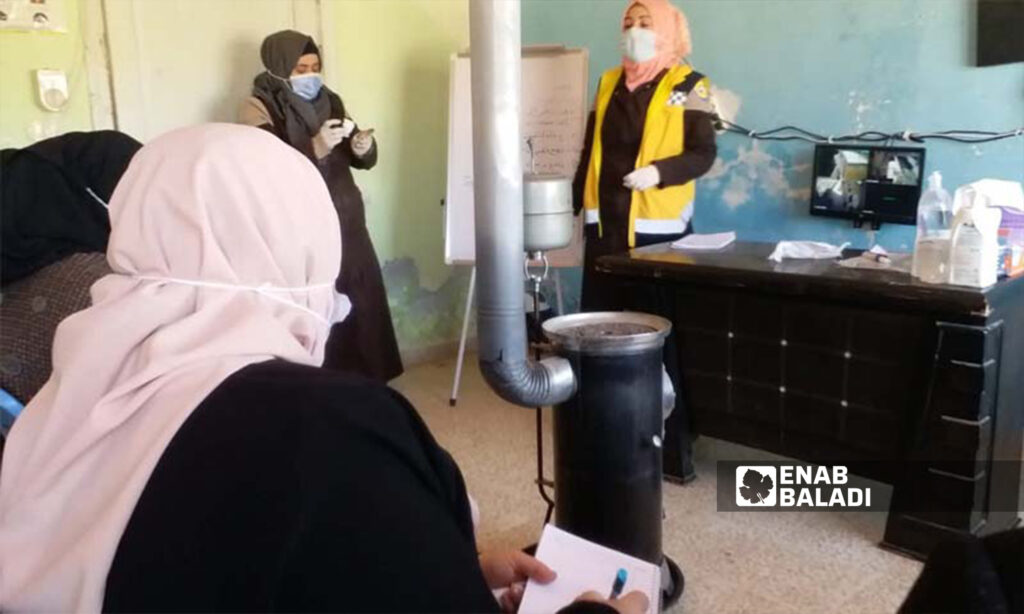Idlib – Huda al-Kulaib
Riham al-Omar, 33, sets out every morning towards the Women’s Civil Defense Center in Idlib to complete her day-to-day tasks of providing primary health care services to the sick and injured and returns home after six hours of work to carry out other tasks in caring for her children and finishing her domestic work.
Al-Omar told Enab Baladi that she was able to adapt to the work she chose and struggled to obtain in order to face difficult living conditions after the death of her husband, who was killed by warplanes’ bombing of her city of Maarat al-Numan, five years ago.
Not only for men
Al-Omar’s journey in finding her work was not easy, as she faced great challenges in terms of mastering the work, entering a new field that women had not previously entered, and in how society accepted this work.
“I challenged my family’s decision because they didn’t want me to work in this field as it’s not common for women to work in it. In their view, this work is beyond women’s ability, as it requires heading to bombed sites and providing first aid to the injured, which exposes women to multiple potential risks,” al-Omar said.
However, al-Omar was able, through her perseverance, to prove her success to those around her and that she is able to work in the most difficult circumstances because she is not weak as seen by the society that “used to put women in the position of the weak, dependent, and unable to work, succeed, or change.”
Al-Omar is one of many women in Idlib and northwestern Syria who became the breadwinners of their families after losing their husbands due to war, to find themselves suddenly responsible for taking care of their children and spending on them in extremely difficult circumstances.
Hundreds of women in Idlib governorate started working in different professions, and some established their own projects despite facing difficulties and risks, in addition to receiving low wages compared to the long working hours.
Saadia produces and exports
Saadia al-Hamdo, 32, searched for a job despite her lack of certificates or experience in order to support her three children after the disability of her husband, who lost his right leg during the conflict.
Desperate to find a suitable job, al-Hamdo started her own project to establish a dried fig workshop, benefiting from her experience in preparing and pressing it since her days in Jabala village, south of Idlib, where she worked in a land full of fig trees before she was forced to flee from it, and settle in the camps of Harbanoush, north of Idlib, after the military operations of the Syrian regime and Russia.
Many questioned the success chances of al-Hamdo’s project, which no woman has ever undertaken alone in the region. But, al-Hamdo was able, with modest means and perseverance, to overcome work difficulties and carry on with her project until today, achieving material and moral gains amid the region’s bad conditions due to a decade of hardship.
Regarding the reason for choosing this project, al-Hamdo told Enab Baladi that Idlib is famous for high-quality fig seasons and that this profession does not require large capital, which prompted her without hesitation to launch her project, which is implemented through multiple stages.
The stages of pressing dried figs begin by storing and sterilizing them in a special warehouse away from humidity and insects. Then comes the bleaching stage, in which basins of water are used while bleaching materials are added to remove all impurities from the fruit. Then the figs are directly exposed to the open air to dry completely. And here begins the stage of sorting figs according to quality.
The sorted figs come under three types, the first is al-Bayadi or the Zahra, the second is called al-Wasati, and the third, low-quality type is called Karkoush or al-Alafi.
The last stage ends with the placing of figs into molds of various sizes to take their final shape. Some molds can be filled with half a kilogram of figs, and others that are smaller in size and accommodate 250 grams, then they are wrapped and sold, according to al-Hamdo.
Al-Hamdo faces difficulties related to marketing as a result of the stagnation of local markets, but she found other solutions through exporting her products to Turkey and from there to various regions and countries in cooperation with a number of merchants, according to what she told Enab Baladi.
Breaking stereotypes
Social counselor, Siba Haj Hussein, spoke to Enab Baladi about the role of women in challenging their reality in northwestern Syria.
She pointed out that Syrian women are trapped by the traditional culture prevailing in society, which does not believe much in the developmental and productive roles of women at the expense of their reproductive, social, and educational roles in the local family circle. However, some women managed to break this stereotyping and work in the most difficult and harsh conditions, achieving remarkable successes on a personal level.
Enab Baladi has previously prepared a report entitled “Caught between rigid beliefs and toxic masculinity: Women in northwestern Syria,” in which it presented the confusion in the social and economic roles of women in northern Syria amidst restrictions on personal freedoms and the absence of controls and rules for the existing authorities’ dealing with women. It also highlighted the impact of the limited understanding of religion on the mechanisms of viewing women’s roles and the inherited social customs dominated by masculinity.

